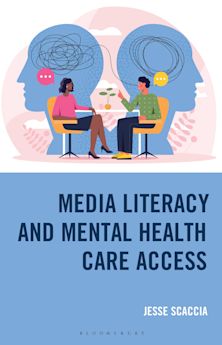Mental Health Communication for Underserved Populations
Mental Health Communication for Underserved Populations
Description
By focusing on effective communication strategies and leveraging cutting-edge research, Mental Health Communication for Underserved Populations makes meaningful progress toward improving mental health outcomes for everyone, with a particular emphasis on underserved populations.
Health communication research offers a critical lens for examining mental health, especially in relation to marginalized populations. Contributors to this volume identify and critically analyze key individual and societal barriers many often face when seeking mental health information and care-including stigma, lack of resources, and cultural differences, among others-and provide informed recommendations for future research as well as for the design of inclusive and effective mental health communication campaigns.
Table of Contents
Introduction: Reaching the Unreached: Enhancing Mental Health through Effective Communication Strategies for Underserved Populations
David Kim (University of Louisiana at Lafayette, USA) & Jin-Ae Kang (East Carolina University, USA)
1. The Use of Storytelling as a Form of Liberatory Agency: Palestinian Refugees in the United States
Amnee K. Elkhalid (University of Arkansas, USA) & Walid A. Afifi (University of California-Santa Barbara, USA)
2. Mental Health and LGBTQ+ Populations: Communicative Solutions for LGBTQ+ Well-Being
Leandra Hinojosa Hernandez (University of Utah, USA) & Natalia Peraza (University of Southern California, USA)
3. An Examination of the Multifaceted Mental Health Stigma Surrounding United States Military Veterans
Rikki A. Roscoe (University of Kansas, USA)
4. Communicating What Is Silent: Black Women Navigating Mental Health
Adrienne F. Muldrow (East Carolina University, USA) & Karlene Cunningham (East Carolina University, USA)
5. Designing Mental Health Communication Strategies for Hispanic and Latino Populations in the U.S.
Do Kyun David Kim & Jin-Ae Kang
6. Housing Instability and Homelessness in Memphis: Mental Health Literacy and Community-Based Research
Joy V. Goldsmith (University of Memphis, USA), Diana R. Humble (University of Memphis, USA), Sachiko Terui (University of Georgia, USA), Tharwa Bilbeisi (Independent Scholar, USA), & Regina Alabere (University of Memphis, USA)
7. e-Mental Health Intervention Strategies for the Low-income Population: A Communicative Approach
Kyung Jung Han (California State University, Bakersfield, USA)
8. Addressing Mental Health Issues of Older People for Healthy Aging
Jin-Ae Kang & Do Kyun David Kim
9. Mental Health Communication for Religious Minorities
Jacob Watson (Indiana University - Indianapolis, USA), Jorge Seifert (USA), & John Parrish-Sprowl (Indiana University, USA)
10. Mental Health Communication Strategies for Individuals with Disabilities: Applying a Socio-Ecological Framework
Jaehyun Kim (East Carolina University, USA)
11. Communication in Substance Use Counseling: The Role of Aggressive Communication
Theodore A. Avtgis (Western Illinois University-Quad Cities, USA) & Veronica Nuzzolo (Independent Scholar, USA)
12. Rural Communities and Mental Health: Challenges and Recommendations from a Health Communication Perspective
Lindsey Jo Hand (Contractor, USA)
13. Mental Health Problems and Computer-Mediated Support: Focus on the Case of North Korean Defectors in South Korea
Surin Chung (Sogang University, South Korea) & Ma Angelica Mercado (Sogang University, South Korea)
14. Cross-Cultural Dialogues: Unraveling and Addressing Mental Health Challenges in International Students through Innovative Health Communication Strategies
Anne Amegbeha Amissah (University of Kentucky, USA), Sarah A. Geegan (University of Kentucky, USA), & Kimberly A. Parker (Independent Scholar, USA)
Index
Product details

| Published | 11 Dec 2025 |
|---|---|
| Format | Ebook (PDF) |
| Edition | 1st |
| Extent | 368 |
| ISBN | 9798765165041 |
| Imprint | Bloomsbury Academic |
| Illustrations | 15 bw illus and 6 tables |
| Publisher | Bloomsbury Publishing |


















